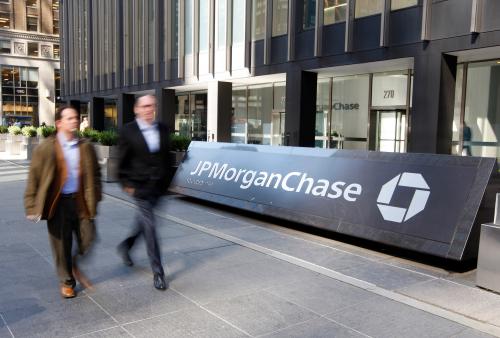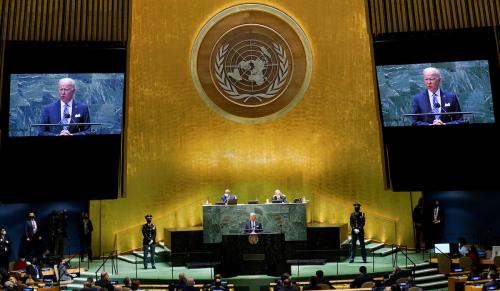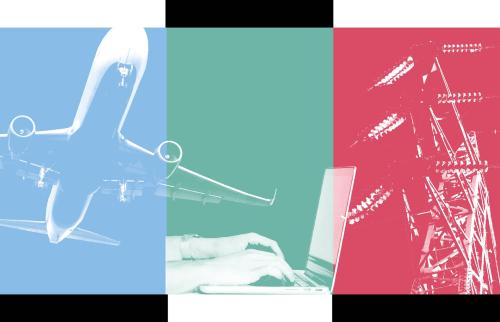The 2015 International Conference on Financing for Development in Addis Ababa was noteworthy in its charge that the Sustainable Development Goals (SDGs) need the business community—the new set of global goals (SDGs) will be achieved by 2030 only with inordinate levels of private finance and the business and management skills of the private sector.
Business Says It Needs the SDGs!
Better Business, Better World is the report of the Business & Sustainability Development Commission, chaired by Mark Malloch-Brown and comprised of leaders of business and civil society. This concise, well-written report (which will be the topic of discussion at a Brookings public event on April 6) lays out the business case for the SDGs. It explains why corporations will benefit from factoring the global goals into their business strategies. In doing so, it also lays the foundation for donor agencies and civil society engaging the private sector.
The report identifies a $12 trillion market for achieving just four of the 2030 goals—food and agriculture, cities (investments such as housing, transportation, and water), energy and materials, and health and well-being—that would produce 380 million jobs. Factoring the SDGs into business strategies will open new business opportunities, introduce efficiencies and innovation, and improve reputations.
SDGs in Corporate Strategies
The business community is not just talking about the SDGs. Some corporations integrated elements of the content of the SDGs before there was such a rubric. Following the issuance of Better Business, Better World, I made an inquiry of a handful of U.S. multinational corporations. What I found is that these corporations are integrating specific social and environmental impacts of their operations and products into their business strategies. Today the SDGs provide a frame of reference for these considerations. Some corporations are integrating specific SDGs into their business plans. Others are not using the SDG terminology but are embedding the content of specific SDGs into their business and corporate social responsibility strategies and publically reporting against them.
Taking a step further, investors can now bet on the SDGs. The Solactive Sustainable Development Goals World Index tracks the market performance of 50 companies assessed to be operating in line with the SDGs. The World Bank has recently announced a bond issue linked to the Solactive Index.
A report by The Washington Post dramatically highlights the extent to which the business community is inculcating social and environmental impact into strategies and business activities and is sometimes ahead of public policy. Apple, Intel, and other corporations are objecting to the administration and congressional effort to rollback section 1502 of Dodd-Frank that requires corporations to verify that their suppliers are not purchasing conflict minerals. They assert they will continue to verify their supplies even if the law is repealed.
Beyond the Business Case
The Oxfam Raising the Bar report argues that corporations have to go beyond the business case because, at times, the business interest and the sustainability interest will be in conflict. The report posits, “Companies should base their engagement (with the SDGs) on their own impacts (on the SDGs), align their core business strategies with the SDGs and work with others toward a system-level change…”
Jane Nelson, director of the Corporate Responsibility Initiative at the Harvard Kennedy School, lays out a collective action approach to system-level change in her forthcoming paper Partnerships for Sustainable Development. The paper documents a host of business partnerships and alliances, some business-alone and some jointly with government and civil society, that function to improve the social and environmental impact of business operations. By operating together by a set of principles, and sometimes jointly investing in innovation, leading corporations in specific sectors can raise the bar for corporate behavior through industrywide alliances that provide the opportunity for companies to share best practices while avoiding putting any single company at a competitive disadvantage.
Triangulating the SDGs, Business, and U.S. Assistance
What is particularly striking about this business case for the SDGs, besides the size of the market potential, is the extent to which these activities correlate with current U.S. government development policies and programs—both in working with countries to create a business friendly policy environment and in engaging with the private sector in specific transactions and alliances.
Take agriculture for example. The U.S. Agency for International Development supports advisory services to governments to improve policies and regulations; invests in research to improve seeds and other inputs and agricultural practices; helps small farmers and cooperatives to reduce waste and adapt new technology; and works with U.S. and local companies on specific investment projects. Through Feed the Future and the New Alliance for Food Security and Nutrition, the USAID has engaged with over 200 global and domestic companies and secured more than $10 billion in investment commitments. Through the Coffee Farmer Resilience Initiative, the agency works with private companies to limit their risk in extending support to coffee farmers in Latin America. The agency has partnered with a local company and the Cold Chain Bangladesh Alliance to build a “cold chain” that makes it possible for small farmers to get their produce to market.
As another example, public-private partnership in energy are substantial. In Power Africa 12 U.S. government agencies, led by USAID, has partnered with over 120 public and private entities to commit $12 billion of public funds and $40 billion of private investment to bring electricity to tens of millions of citizens in Africa. A key role for U.S. government agencies is providing technical assistance and advice to African governments on creating the policies and regulations that will facilitate private investment in the energy sector. With less than $8 million from USAID, PFAN-Asia has supported some $500 million in clean energy investment.
USAID is also engaging with private companies in investing in solutions in health, education, tropical foreign preservation, water and sanitation, and financial inclusion.
The development activities of USAID and other U.S. government agencies are a win-win for developing countries and U.S. companies. At the same time as improving economic and social policies and regulations in recipient countries, these collaborations help U.S. companies understand and navigate local environments and compete for opportunities, thereby contributing to their competitiveness.
Simply put, business is paying attention to the SDGs. And U.S. assistance programs complete the triangle linking the business community with the SDGs to reduce poverty and promote inclusive economic growth.







Commentary
The SDGs need business, business needs the SDGs
April 3, 2017